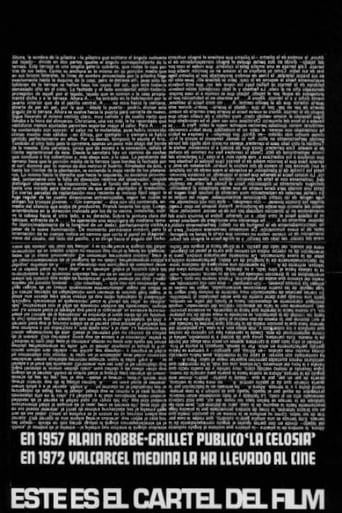La celosía
The film is the book and at the same time it is not. The transposition of the work on paper to the screen is, in this case, the occupation of the conceptual artist Isidoro Valcárcel Medina. Through on-screen texts and a succession of voices that read different passages, Medina presents the filmic adaptation of Alain Robbe-Grillet's book. The novel is a tremendously optical reading of objects and landscapes made by a jealous husband who deforms and subjectivizes reality. The film objectifies the texts in the same way by putting them as they are on the screen, but so is the reading of free texts and languages and associations. As the poster that the artist himself made says: “In 1957 Alain Robbe-Grillet published La Celosía. In 1972 Isidoro Valcárcel has taken it to the cinema.” A film that is an exercise on dissociation and the duration of the shot. The film is the book and at the same time it is not. The transposition of the work on paper to the screen is, in this case, the occupation of the conceptual artist Isidoro Valcárcel Medina. Through on-screen texts and a succession of voices that read different passages, Medina presents the filmic adaptation of Alain Robbe-Grillet's book. The novel is a tremendously optical reading of objects and landscapes made by a jealous husband who deforms and subjectivizes reality. The film objectifies the texts in the same way by putting them as they are on the screen, but so is the reading of free texts and languages and associations. As the poster that the artist himself made says: “In 1957 Alain Robbe-Grillet published La Celosía. In 1972 Isidoro Valcárcel has taken it to the cinema.” A film that is an exercise on dissociation and the duration of the shot. The film is the book and at the same time it is not. The transposition of the work on paper to the screen is, in this case, the occupation of the conceptual artist Isidoro Valcárcel Medina. Through on-screen texts and a succession of voices that read different passages, Medina presents the filmic adaptation of Alain Robbe-Grillet's book. The novel is a tremendously optical reading of objects and landscapes made by a jealous husband who deforms and subjectivizes reality. The film objectifies the texts in the same way by putting them as they are on the screen, but so is the reading of free texts and languages and associations. As the poster that the artist himself made says: “In 1957 Alain Robbe-Grillet published La Celosía. In 1972 Isidoro Valcárcel has taken it to the cinema.” A film that is an exercise on dissociation and the duration of the shot. The film is the book and at the same time it is not. The transposition of the work on paper to the screen is, in this case, the occupation of the conceptual artist Isidoro Valcárcel Medina. Through on-screen texts and a succession of voices that read different passages, Medina presents the filmic adaptation of Alain Robbe-Grillet's book. The novel is a tremendously optical reading of objects and landscapes made by a jealous husband who deforms and subjectivizes reality. The film objectifies the texts in the same way by putting them as they are on the screen, but so is the reading of free texts and languages and associations. As the poster that the artist himself made says: “In 1957 Alain Robbe-Grillet published La Celosía. In 1972 Isidoro Valcárcel has taken it to the cinema.” A film that is an exercise on dissociation and the duration of the shot.



 AD
AD